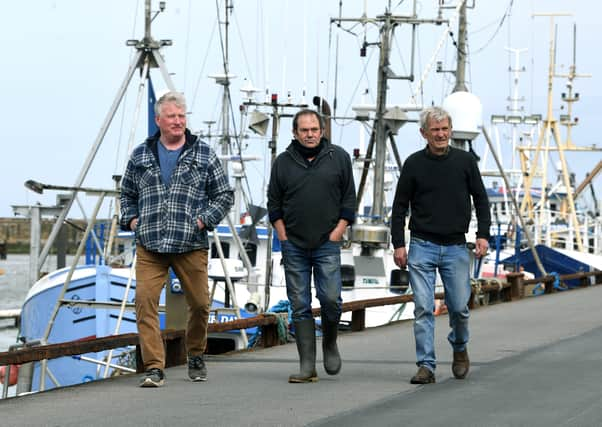Fishing rules continue to wreck traditional Yorkshire net fishermen’s livelihoods months after Brexit


Frank Powell Andrew Sanderson and Shaun Wingham have 125 years experience between them. For years the trio reaped a good living fishing off the Holderness beaches using nets – an age-old practice dating back millennia.
One of their key target species is sea bass – a fishery awarded coveted Marine Stewardship Council status in 2007 for ticking all the right environmental boxes.
Advertisement
Hide AdAdvertisement
Hide AdHowever in 2018 North Eastern Inshore Fisheries and Conservation Authority (Ifca) stopped issuing intertidal licences, following a “precautionary” EU ban on shore fishing for sea bass.
The fishermen had been hoping to get their fishery back up and going in 2021, but EU fisheries legislation was carried over into UK law following Brexit, meaning the ban still stands.
To add to their woes their salmon and sea trout licences from the Environment Agency, which run from March to August, make them stay by their nets 23 hours a day and prohibit them from leaving nets in the water overnight, making the job “unworkable”.
Mr Powell has to sell Icelandic fish from his shop in Bridlington, as he can’t catch his own. He draws a line on selling farmed sea bass from Greece or Turkey on principle.
Advertisement
Hide AdAdvertisement
Hide AdMeanwhile, he says local inshore boats are allowed to catch sea bass as a percentage of their catch and anglers can land two of the fish a day.
Mr Powell said: “When Boris was campaigning he said we were going to get back our coastal fisheries back up and going. But it is now worse than ever.
“We are now told that EU regulations will continue as ‘business as usual’ for a further five-year consultation period.
“We feel that no one is listening and that because we are a small group of fishermen working traditional methods no one is bothered if we just disappear.”
Advertisement
Hide AdAdvertisement
Hide AdIn a letter to their MP Sir Greg Knight, Mr Powell and Mr Sanderson accused the authorities of being unaccountable and “heavy-handed”, sending four officers at a time to check up on just one man.
The trio have had fish and nets confiscated and on several occasions been threatened with prosecution after being accused of breaking the law. But the cases have been dropped before getting to court.
Mr Powell said they’d asked be taken to court so the matter could be heard once and for all, adding: “The main thing is that these authorities aren’t accountable. They are making unworkable rules for us and there is nowhere you can take them to.”
Mr Sanderson said he didn’t vote for Brexit to stop other nations fishing in UK waters - having fished alongside the Dutch and the Belgians for years – but “so we could fish as well”.
Advertisement
Hide AdAdvertisement
Hide AdIt’s the time of year when he has to decide whether to take up his sea trout licence, but says he is frightened to, as he knows his nets will be “full of sea bass”.
He said: “There’s nothing worse than having Ifca standing next to you – they did it one year – took a catch of dozens of sea bass and took them to landfill.”
In 2019 the Ifca’s chief fisheries officer David McCandless described the sea bass ban as an “absolutely classic example of how the Common Fisheries Policy doesn’t work”.
Last week he said since the measures had been introduced, the status of the species had been “improving” year on year, according to the International Council for the Exploration of the Seas.
Advertisement
Hide AdAdvertisement
Hide AdHowever, the Ifca’s position would remain unchanged “until such time as the UK Government develops its UK-centric legislation” replacing EU legislation.
He said he’d lobbied hard for movement on the fishery, adding: “Defra have made it clear that they view it as a priority. There’s still a decent chance for October 2021, if not maybe another six months following that.”And he insisted they hadn’t been overzealous, adding: “The bottom line remains that as a statutory body we can’t permit an illegal activity.”
Defra said it had raised the issue in current annual negotiations with the EU.
They said any complaints not resolved by the IFCA should be raised with the sponsoring body in the relevant local authority, and if they remained unsatisfied with the Ombudsman.